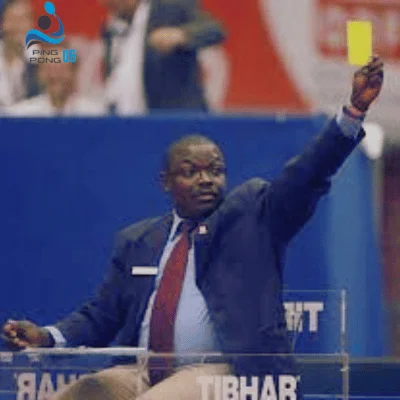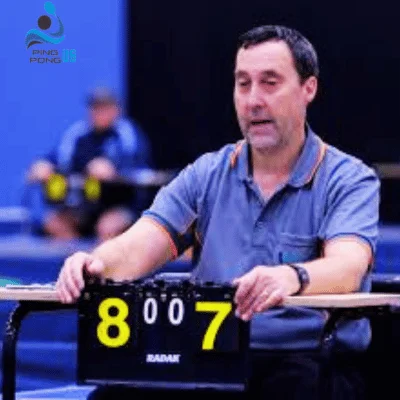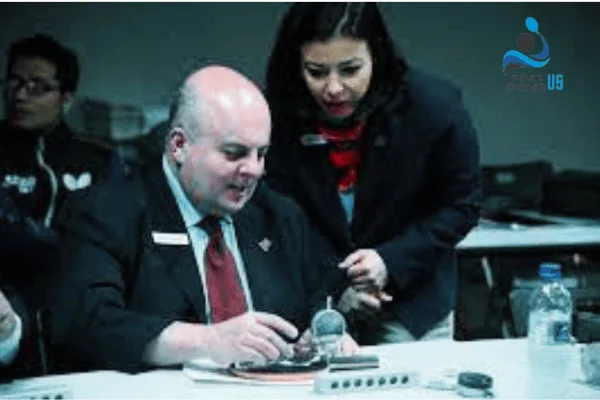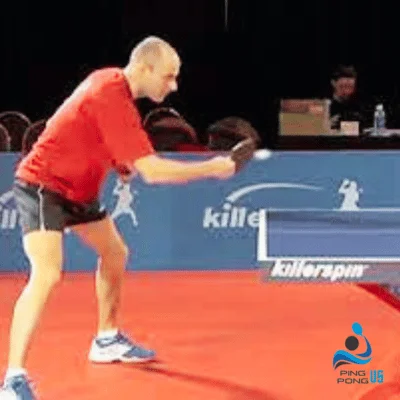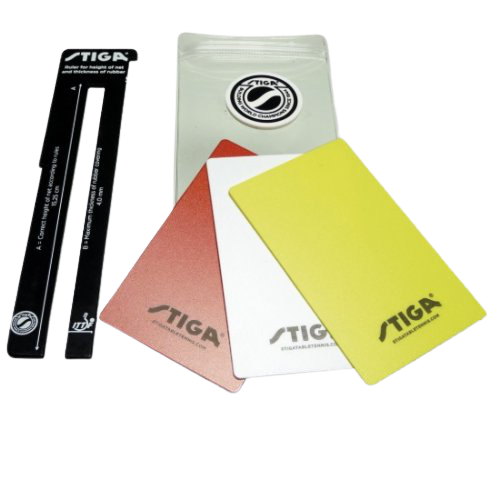In table tennis, there are special people called officials who make sure everything is fair and runs smoothly during matches and tournaments.
These officials can be divided into two groups: Umpires and Referees.
Umpires focus on controlling individual matches, making sure players follow the rules genuinely. They watch closely, enforce rules like serving correctly, and handle any problems that come up during the game.
Referees have a bigger job; they oversee entire tournaments, not just single matches. They make sure everything happens genuinely, from following the rules to solving any disputes between players. Together, Umpires and Referees play vital roles in keeping table tennis matches fair and enjoyable for everyone involved.
In this blog, we will discuss the Roles and Responsibilities of Table Tennis Officials, along with their qualifications, training, and rules, and essential duties involved in officiating matches.
Number of Officials in a Table Tennis Match
In a table tennis match, several officials work together to ensure the game’s fairness and smooth operation. These officials include:
Referee:
They’re like the boss, in charge of making sure everyone follows the rules and solving any problems.
Umpire:
They’re like the referee’s helpers, watching the game closely, making sure players play fair, and deciding who scores points.
Assistant Umpire:
They’re also helpers, helping the umpire and sometimes judging if the ball is in or out of bounds.
Stroke Counter:
This person keeps track of how many times players hit the ball and what kinds of shots they use.
Timekeeper:
They’re responsible for keeping track of how much time each part of the game takes, making sure everything stays on schedule.
Sometimes, in big tournaments, there might be another person called a deputy who helps the referee keep everything running smoothly.
Roles and Responsibilities of Table Tennis Officials
Referee Roles and Responsibilities in Table Tennis
- Tournament Oversight: The referee’s primary duty is to oversee and manage the entire tournament, ensuring its smooth operation from start to finish.
- Rule Interpretation: They serve as the ultimate authority on the interpretation and application of table tennis rules, providing guidance to players, umpires, and other officials.
- Conflict Resolution: Referees are responsible for resolving disputes or conflicts that may arise during matches or throughout the tournament, employing their expertise and impartial judgment.
- Officiating High-Stakes Matches: In important matches or critical situations, referees may directly officiate to ensure fairness and integrity are upheld.
Umpire Responsibilities in Table Tennis
- Match Control: Umpires oversee individual matches, making sure players follow the game’s rules and regulations.
- Rule Enforcement: They enforce rules such as serving regulations, fault calls, and penalties for rule violations.
- Scorekeeping: Umpires carefully maintain the score during the match, ensuring accuracy and fairness in scoring.
- Player Management: Umpires manage player conduct during matches, intervening when necessary to address unsportsmanlike behavior or disputes.
Assistant Umpire Responsibilities
- Supporting Umpire: Assistant umpires assist the main umpire in controlling matches, providing support and assistance as needed.
- Line Judging: They may be responsible for line judging, determining whether the ball has landed in or out of bounds.
- Assisting with Decisions: Assistant umpires help the main umpire in making decisions on various aspects of the game, contributing to the overall fairness and integrity of the match.
Scorer Responsibilities
- Scorekeeping: Scorers are responsible for accurately recording the score and other relevant information during matches.
- Communication: They communicate the score to players, umpires, and spectators as needed, ensuring everyone is aware of the current match status.
- Attention to Detail: Scorers must have keen attention to detail to ensure accuracy in scorekeeping and recording match statistics.
Timekeeper Responsibilities
- Match Timing: Timekeepers are responsible for keeping track of the time during matches, ensuring that matches progress according to schedule.
- Managing Match Duration: They monitor the duration of each match, signaling when time limits are reached for specific game or match segments.
- Coordination with Officials: Timekeepers coordinate with umpires and referees to ensure smooth transitions between match segments and adherence to time limits.
Stroke Counter Responsibilities
- Tracking Shots: Stroke counters track the number of shots played by each player during a match.
- Recording Stroke Statistics: They record stroke statistics such as forehand, backhand, and other types of shots, providing valuable insights into player performance.
- Analysis: Stroke counters may analyze stroke data to identify trends or patterns in players’ gameplay, offering feedback to players and coaches for improvement.
Official’s Roles and Responsibilties in Table Tennis Shown in This Video
Difference Between Refree and Umpire
The difference between a referee and an umpire lies primarily in their roles and responsibilities in sports, including table tennis:
Referee:
- The referee oversees the overall conduct of a match or game.
- They ensure that all aspects of the game are carried out according to the rules and regulations.
- Referees have the authority to make final decisions on disputes, penalties, and any other issues that may arise during the game.
- In some sports, such as soccer and basketball, referees are responsible for managing the game clock and signaling the start and end of each period or half.
- Referees are typically positioned off the playing field or court and may have assistants to help them monitor the game.
Umpire:
- The umpire, on the other hand, focuses on specific aspects of the game, such as individual matches or certain rules.
- They enforce rules and regulations within their designated area of responsibility, ensuring fair play and adherence to the rules.
- Umpires make real-time decisions during matches, such as determining the legality of serves, fault calls, and issuing warnings or penalties for rule violations.
- In sports like baseball or tennis, umpires are responsible for making calls on specific plays, such as balls and strikes in baseball or line calls in tennis.
- Umpires are typically positioned on or near the playing field or court to have a clear view of the action and make accurate decisions.
In summary, while both referees and umpires play essential roles in ensuring the fairness and integrity of sports competitions, referees have a broader authority over the entire game, while umpires focus on specific aspects or matches within the game.
Blue Badge Umpire – Roles and Responsibilities in Table Tennis
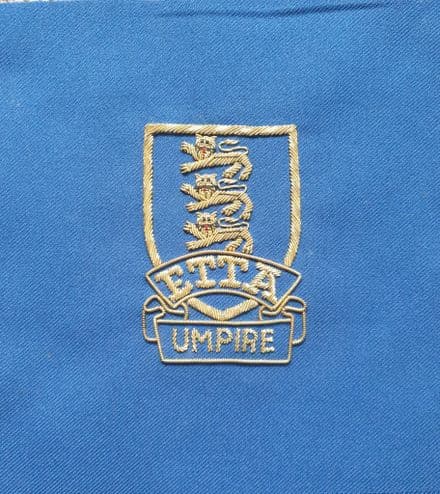
Umpires need special gear to do their job well. This includes yellow and red cards for giving warnings and penalties, timeout cards for managing breaks, and metal coins for deciding tiebreaker situations.
In big international matches, umpires wear uniforms approved by the ITTF.
But in smaller tournaments, they wear whatever the organizers say is okay.
Having the right gear helps umpires keep games fair and run smoothly for everyone playing.
Compensation for table tennis referees and umpires varies based on factors like the tournament’s level, the sport’s popularity, and the official’s experience.
At professional tournaments, referees and umpires typically receive payment for their services. This payment can be substantial, especially for high-profile events like international championships.
However, in smaller or amateur competitions, many officials volunteer their time out of love for the sport. While some may receive modest compensation or reimbursement for expenses like travel and accommodation, others may benefit from non-monetary rewards such as equipment or training opportunities.
In general, whether they get paid or not, referees and umpires are super important for making sure table tennis matches are fair and run smoothly.
Qualifications and Training for Table Tennis Officials
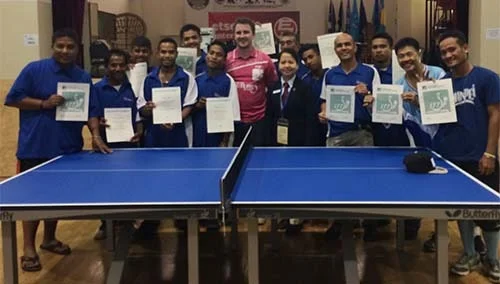
Becoming an international table tennis umpire is a journey that requires dedication and skill. Here’s a detailed breakdown of the qualification process:
State Umpire:
- Complete the state umpire course, learning the ins and outs of officiating.
- Gain practical experience by umpiring for 10 hours at local competitions without supervision.
- Receive mentoring during 4 tournament matches to refine your skills.
- Become a member of the Table Tennis Association (TTA) or an affiliated organization to stay connected with the table tennis community.
National Umpire:
- Demonstrate your commitment by supervising state matches for a period of 2 years.
- Successfully pass the national umpire course, further honing your expertise.
- Undergo assessment in various match formats, including singles, doubles, and larger-scale competitions, with a minimum of 6 matches evaluated.
- Maintain your membership with the TTA or affiliated organization to stay updated on developments in the sport.
International Umpire:
- Gain valuable experience by actively officiating at national competitions for a minimum of 2 years.
- Qualify by passing the rigorous ITTF Umpires exam, showcasing your comprehensive knowledge and proficiency.
- Retain your membership with the TTA or affiliated organization to remain part of the global table tennis community.
Additional Information:
- Throughout the journey, continuous learning and improvement are essential. Umpires often attend workshops, seminars, and training sessions to stay updated on rule changes and best practices.
- Networking with fellow umpires and officials can provide valuable support and opportunities for growth.
- International umpires may have the chance to officiate at prestigious events such as the Olympics, World Championships, and World Cup, representing the pinnacle of their umpiring careers.
Members of the Jury Panel in Table Tennis Tournaments
In every significant table tennis tournament, a jury of three members is established to address any issues or misunderstandings that may arise during matches. The jury’s collective decision serves as the final resolution. Here are the members of the jury:
Head Table Tennis (SU-DS) Representative:
This individual represents the governing body or association responsible for overseeing table tennis in the respective region. Their presence ensures that decisions align with the standards and regulations set by the organization.
Referee:
The referee, who is part of the jury, knows a lot about table tennis rules. They’re really important for making sure everyone plays fair and solving any problems that happen during the game.
Tournament Organizing Committee Representative:
This member represents the group responsible for organizing and managing the tournament. They bring insight into the specific logistics and considerations of the event, contributing to well-informed decisions.
Together, these jury members form a knowledgeable and balanced panel capable of addressing and resolving any issues that may affect the integrity and smooth running of the tournament.
Code of Conduct and Ethics for Table Tennis Officials
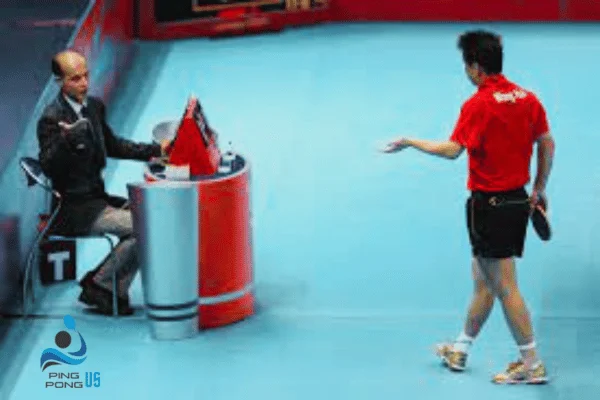
Table tennis officials must behave well and follow the rules while they work. They should:
- Be fair to everyone, without taking sides.
- Do their job honestly and without cheating.
- Act professionally and treat everyone with respect.
- Make decisions confidently, based on what’s right.
- Show respect for the game, players, and others.
- Solve problems calmly and fairly.
- Keep learning to stay good at their job.
- Keep important information private to protect the sport’s reputation.
By following these rules, table tennis officials make sure games are fair and fun for everyone involved.
Challenges Faced by Table Tennis Officials
Being a table tennis official isn’t always easy. Here are some common problems they face during matches:
Keeping up with the fast-paced game:
Table tennis moves quickly, so officials need to stay focused to catch every move and make the right calls.
Handling player emotions:
Sometimes players get upset, and officials need to calm them down and make sure the game stays fair.
Resolving rule disagreements:
Players may disagree with calls, so officials must settle disputes quickly and keep the game going.
Being consistent with rules:
It’s important for officials to enforce rules fairly throughout the match.
Dealing with noisy crowds:
Sometimes spectators can be loud and distracting, making it harder for officials to concentrate.
Learning new technology:
As technology changes, officials may need to learn how to use new tools like instant replay.
Handling pressure:
Officiating important matches can be stressful, but officials need to stay calm and make the right decisions.
Keeping players safe:
Officials also need to watch out for any dangers on the court to make sure everyone stays safe.
Even with these challenges, table tennis officials play a crucial role in making sure matches are fair and fun for everyone involved.
Conclusion
To sum up, the roles and responsibilities of table tennis officials are like the silent champions of the game, ensuring that every match is played fairly and smoothly. They’re the ones who keep track of scores, step in to solve any problems that arise, and make sure all players follow the rules.
Whether they’re getting paid for their efforts or volunteering their time out of sheer love for the sport, their passion shines through in every decision they make.
Let’s take a moment to express our gratitude to these dedicated individuals who play such a vital role in making table tennis the awesome sport that it is. Hats off to the table tennis officials – you truly make a difference!
Frequently Asked Questions About the Roles and Responsibilities of Table Tennis Officials
What are the different roles of table tennis officials?
Table tennis officials have various roles, including umpires who oversee individual matches and referees who manage the overall tournament.
How do you become a certified table tennis official?
To become a certified table tennis official, you typically need to complete official courses, pass examinations, gain practical experience, and receive certification from a recognized governing body.
What are the qualifications required to be a table tennis official?
Qualifications for table tennis officials may include a deep understanding of the game’s rules, completion of official courses, successful examination results, practical experience, and certification from a governing body.
What training is involved in becoming a table tennis official?
Training for table tennis officials involves completing official courses covering rules, match management, and code of conduct, as well as gaining practical experience through officiating matches and receiving mentoring from experienced officials.
What are the main responsibilities of table tennis officials during matches?
Table tennis officials are responsible for ensuring fair play, enforcing rules, maintaining the integrity of the game, resolving disputes, and overseeing the smooth progression of matches.
Do table tennis officials get paid?
Table tennis officials may receive payment for their services at professional tournaments, while others volunteer their time. Payment varies depending on factors such as the level of competition and the governing body overseeing the event.
What challenges do table tennis officials face during matches and tournaments?
Challenges faced by table tennis officials may include keeping up with fast-paced matches, managing player emotions, resolving rule disputes, maintaining consistency in officiating, handling crowd reactions, adapting to new technology, managing pressure, and ensuring player safety.
How important are table tennis officials in ensuring fair play?
Table tennis officials play a crucial role in ensuring fair play and the smooth running of matches. They enforce rules, make impartial decisions, resolve disputes, and contribute to the integrity and enjoyment of the sport for players and spectators alike.


